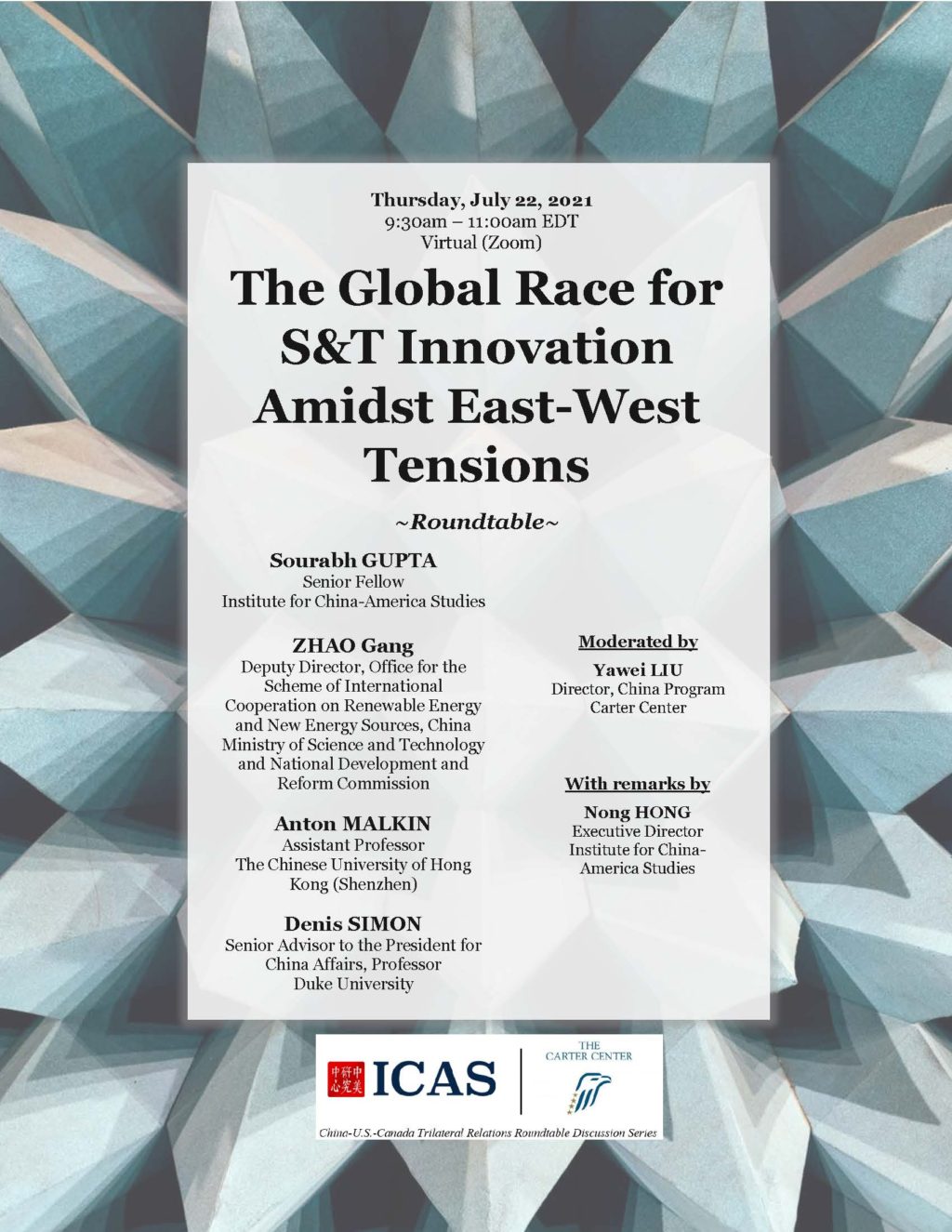Full Broadcast Recording of “The Global Race for S&T Innovation Amidst East-West Tensions”, July 22, 2021 (9:30am – 11:00am EDT)
SUMMARY
On July 22, 2021, the Institute for China-America Studies (ICAS) and the Carter Center China Program hosted a public trilateral roundtable on the complex China-U.S.-Canada interactions in science and technology innovation titled “The Global Race for S&T Innovation Amidst East-West Tensions”. The roundtable, held virtually, was also part of the China-U.S.-Canada Trilateral Roundtable Discussion series. Dr. Hong Nong, Executive Director and Senior Fellow at ICAS, delivered the opening remarks and announced the launch of ICAS’ newest program – the ICAS Trade ’n Technology (TnT) Program. The roundtable was moderated by Dr. Liu Yawei, Director of the China Program at the Carter Center, and featured four speakers: Dr. Zhao Gang, a Deputy Director at the China Ministry of Science and Technology and National Development and Reform Commission; Dr. Denis Simon, Senior Advisor to the President for China Affairs at Duke University; Dr. Anton Malkin, Assistant Professor at The Chinese University of Hong Kong (Shenzhen); and Mr. Sourabh Gupta, Senior Fellow at the Institute for China-America Studies.
The roundtable featured various perspectives on science and technology (S&T) innovation and competition from the Chinese, American, and Canadian angles. A brief historical summary of China’s telecommunication technology development was provided, as well as an overview of four decades of U.S.-China S&T exchanges dating back to the late-1970s. A common feature was the extent to which American participants were an integral element of China’s S&T and telecoms sector development, particularly during the formative years. The panelists conceded nevertheless that the decoupling-related tensions in the high-technology and advanced manufacturing sectors are real today, and that the two sides stand at an important inflection point in their technology exchange relationship. In no small measure, this inflection point is linked to the evolving shift from what was once a highly asymmetrical relationship in S&T development to one that reflects a greater degree of parity in terms of capacity and capability. It is of the essence, therefore, that the S&T cooperative arrangements that were put in place four decades ago are also redesigned, and new rules of the road established in order to keep pace with contemporary developments with the national S&T ecosystems on both sides of the Pacific.
The panelists expressed hope that all sides would find it in their interest to rebuild trust and engage in mutually beneficial technological collaboration and development. China, for one, seeks more – not less – international cooperation in S&T development and would prefer to draw a clearer distinction between geopolitical considerations and genuine scientific cooperation. Canada, too, would be well-served if it could transcend its ever-present dilemma of being forced to choose between the U.S. and China on technology policies and issues. Being neither a large domestic market, with few or no large globally competitive ICT firms, in addition to not being well-positioned to extract value from the next wave of S&T commercialization for lack of ownership of standard-essential patents, the splintering of global S&T ecosystems is not in Canada’s interest.
In this regard, a key consideration going forward, therefore, is the new Biden Administration’s approach on S&T coupling – and decoupling – vis-à-vis China. On this point, the early prognosis is more pessimistic than optimistic. Although the administration has shown itself to be more deliberate and nuanced in its application of technology controls than its predecessor, in one fundamental area of principle, it continues to march in lockstep with the Trump Administration: This is the pivot away from championing the integrity of market-based international rules in technology competition to the willingness to engage in a zero-sum competition, including the deployment of bloc-based practices that skew private markets, in order to consolidate and maintain its hold over the commanding heights of global technological supremacy.
China-U.S.-Canada S&T cooperation and competition remain in the balance, and critical policy actions on both sides of the Pacific will define its all-important contours and outcomes in the years ahead.


